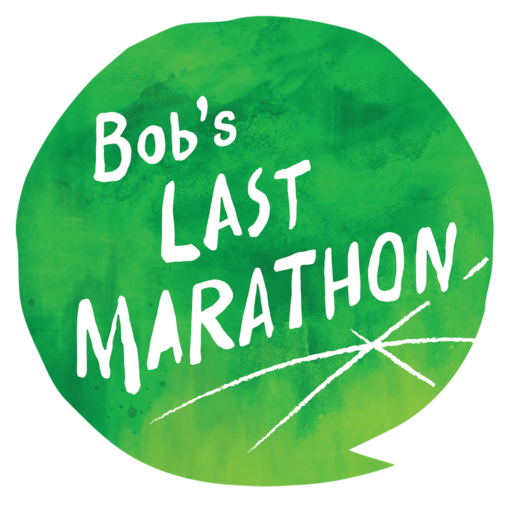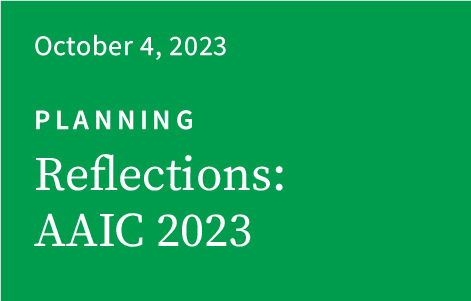Transcript
Reflections: AAIC 2023
The Alzheimer’s Association International Conference, or AAIC, is the world’s largest dementia research conference. This past July, AAIC was live in Amsterdam and also offered virtually. AAIC supports the community’s efforts to advance research and care that are so important to so many people, and this year there were nearly 9,500 attendees representing 103 countries. I had the opportunity to attend the conference as a poster presenter, and given my role as a social worker supporting dementia caregivers, I attended many of the sessions on dementia care. Though hundreds of the presentations were scientific in nature and shared fascinating data in disease nuances, diagnostics, imaging, and drug discovery, I will, in this podcast episode, share the findings presented in my colleagues’ and my poster along with takeaways from other presentations that support the work we do.
In an earlier episode, I talked about the importance of social engagement for people living with dementia and highlighted the Penn Memory Center’s Time Together program. My colleagues and I were honored to be asked to present our pilot findings at AAIC. Time Together offers opportunities for older adults with dementia to interact meaningfully with college students while giving care partners a break. The primary aim of our study was to evaluate the impact of Time Together on mood and socialization for the person with dementia, self-care for care partners, and career preferences for student volunteers. In our pilot study, our qualitative evaluation showed that in the person with dementia, mood either improved or remained the same after participation. For care partners, we learned that most faced challenges with socialization as well as self-care as a result of their caregiving responsibilities. At baseline, all care partners interviewed reported that poor time management or not prioritizing self-care resulted in missing out on cherished opportunities such as travel, volunteering, or time to themselves. After participating in the pilot program, caregivers reported an increase in self-care activities to promote physical health, mental health, social support, time management, and cognitive engagement. By getting small pockets of time when students were providing respite, caregivers were able to prioritize diet and exercise, meditation or other relaxing activities, talking to family or friends, and reading or engaging in brain exercises. We learned that most students who participated were comfortable working with older adults, although many lacked prior experience. Coming into the program, students had hoped to gain connection, improve socialization, and enhance qualities such as compassion, reflection, altruism, and wisdom. These were achieved, along with stress relief as noted by some. Prior to participating, students experienced fears and anxieties about their capacity to interact meaningfully, about encountering health or personal care issues, or about not being able to find meaningful activities. After participating, all students reported decreased anxieties about these concerns, though their career preferences were not influenced by their participation in the program. All in all, we conclude that as a respite program using student volunteers, Time Together benefited the person with dementia, the care partner, and the student. We envision future quantitative research based on a larger, more diverse sample, with a control for comparison. The study also pointed out that care partners can benefit from additional training or coaching in time management, prioritizing self-care, and identifying resources.
There were many rich sessions on improving outcomes for caregivers. Researchers shared ways to tailor caregiver programs specifically for Black care partners by broadening family as a resource, training Black facilitators to lead caregiver training programs, streamlining educational materials, and using culturally specific examples. They also highlighted the importance of considering cultural factors such as honoring parents and spouses and understanding the importance of staying home rather than moving a loved one to a facility in the later stages. They noted that Black caregivers report higher levels of racism and discrimination that prevent them from seeking help or participating in research, and so it’s important to consider caregivers’ intersectionality, or multiple social and political identities such as race, gender, and class that might put people of color at a disadvantage, and to involve stakeholders when tailoring interventions. In short, for caregiver programs that are intended for diverse populations, deeper-level customization is critical.
The Care Ecosystem out of University of California San Francisco was highlighted as a model to address gaps in care and prevent emergency room admissions for people living with dementia. It uses a care team navigator, an unlicensed trained professional who manages a caseload of families. The navigator triages families to expert care when needed and provides care coordination. The model is organized around caregiver support, decision making for legal and financial matters, and caregiver coaching to manage difficult behaviors. The navigator reconciles medications through regular screening and consults with a pharmacist as needed. The model emphasizes the importance of assessing the patient’s stage of dementia and teaching caregivers appropriate skills depending on whether the person with dementia is experiencing a mild, moderate, or severe level of impairment. In the randomized clinical trial findings presented, the Care Ecosystem resulted in lower care costs for health systems and families and reduced caregiver burden. This model is well positioned to meet the requirements of a newly announced Centers for Medicare & Medicaid Services (CMS) model, Guiding an Improved Dementia Experience (or GUIDE), which aims to support people living with dementia and their unpaid caregivers by using a care navigator and reduce hospital or ER admissions for patients. There is also reimbursement for in-home or facility-based respite care as part of the model. Stay tuned for a future Bob’s Last Marathon episode dedicated to the GUIDE model.
Technology to support people living with dementia and their care partners was another highlight. Technology can be used to promote safety, encourage functional well-being, monitor for mental status, and give voice to the caregiving experience. A presentation using tech for home safety discussed in-home monitoring to support caregivers. The use of radar, light sensors, and smart energy tech along with fall detection and nocturnal well-being was discussed. Researchers shared their findings on a tablet-based assessment tool to detect elder abuse in older adults and those in the early to moderate stages of dementia—another example of how technology can help improve safety. Technology can also be used to support cognitive function. We learned about a health app to improve outcomes of people with mild cognitive impairment by offering tips to increase social activity and physical health, while tracking behavioral changes. We also learned about adaptive video games that can offer direct feedback for early detection of cognitive impairment and using memory games to promote cognitive rehabilitation. Another health-promoting app was tested in a rural Southern community. The researchers recruited high school students and faith-based health educators to serve as mentors who trained older adults to use smart watches to track behaviors in order to detect early cognitive decline. The use of technology as a form of narrative therapy was also presented. A group from India presented on their use of film and digital media to develop cost-effective, culturally sensitive interventions to improve outcomes by filming caregivers telling their stories as a way to better understand their experience, which proved therapeutic. I share these highlights with you to illustrate ways in which technology can be used for improved outcomes in older adults, early detection, behavioral change, and caregiver support.
I hope that everyone listening to this podcast is aware of the Alzheimer’s Association’s free 24-hour helpline. It receives more than 800 calls a day and connects callers to master’s level care consultants. Nancy Hodgson is the Chair of the Department of Biobehavioral Health Sciences at the University of Pennsylvania School of Nursing, and her team was asked to evaluate the effectiveness of the helpline. Many of the people who call the helpline are caregivers, and the care consultants fielding the calls provide them with emotional support, action steps to solve issues, and resources on how to find support groups. Clinicians were trained to guide callers to consent to research participation, and they administered pre- and post-surveys to evaluate the efficacy of the intervention. In her analysis, Dr. Hodgson found that 80 percent of callers to the helpline benefited in some way after a single call. She also discovered that the 20 percent who did not benefit had greater emotional needs than those who did, and she and her team tested the effectiveness of providing a callback to this cohort. Indeed, Dr. Hodgson reported that the majority of the caregivers who received a callback had an improved ability to manage their stress levels and discouragement. I thought it was important to share these findings as a way to encourage caregivers to use this helpline as another resource or tool. The Alzheimer’s Association’s 24-hour helpline number is 800-272-3900.
There were far too many interesting topics covered for a single podcast episode, but I hope you found the ones I shared helpful or insightful in some way. Next July, AAIC will hold the conference right here in Philadelphia. Please consider registering and reach out to me if you’d like to visit us at the Penn Memory Center while you’re in town! For more information, visit www.aaic.alz.org.
Felicia Greenfield, MSW, LCSW
Executive Director
Penn Memory Center
www.pennmemorycenter.org

